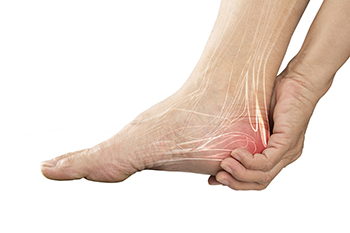
The plantar fascia is a long, fibrous band of tissue on the bottom of the foot that connects the heel with the toes. It helps form the arch and stabilize the foot. The plantar fascia is in a constant state of flux—alternating between lengthening and contracting as we walk and run. Running and other physical activities can be taxing on the plantar fascia. So can being obese, standing at work all day, or wearing shoes that don’t offer proper arch support. Excessive strain and stress on the plantar fascia can cause it to become irritated, torn, inflamed, and ultimately painful. This is a condition known as plantar fasciitis, which is the most common form of heel pain. The pain of plantar fasciitis is most severe when you take your first steps in the morning. It can sometimes be alleviated by refraining from physical activity, icing the bottom of the feet, losing weight, or switching to more supportive footwear. If the pain does not subside, or worsens, it is suggested that you make an appointment with a podiatrist. Podiatrists treat plantar fasciitis frequently and have various treatments to repair the plantar fascia, reduce inflammation, and eliminate the heel pain it causes.
Plantar fasciitis is a common foot condition that is often caused by a strain injury. If you are experiencing heel pain or symptoms of plantar fasciitis, contact Dr. John P. Beaupied from Palos Podiatry. Our doctor can provide the care you need to keep you pain-free and on your feet.
What Is Plantar Fasciitis?
Plantar fasciitis is one of the most common causes of heel pain. The plantar fascia is a ligament that connects your heel to the front of your foot. When this ligament becomes inflamed, plantar fasciitis is the result. If you have plantar fasciitis you will have a stabbing pain that usually occurs with your first steps in the morning. As the day progresses and you walk around more, this pain will start to disappear, but it will return after long periods of standing or sitting.
What Causes Plantar Fasciitis?
- Excessive running
- Having high arches in your feet
- Other foot issues such as flat feet
- Pregnancy (due to the sudden weight gain)
- Being on your feet very often
There are some risk factors that may make you more likely to develop plantar fasciitis compared to others. The condition most commonly affects adults between the ages of 40 and 60. It also tends to affect people who are obese because the extra pounds result in extra stress being placed on the plantar fascia.
Prevention
- Take good care of your feet – Wear shoes that have good arch support and heel cushioning.
- Maintain a healthy weight
- If you are a runner, alternate running with other sports that won’t cause heel pain
There are a variety of treatment options available for plantar fasciitis along with the pain that accompanies it. Additionally, physical therapy is a very important component in the treatment process. It is important that you meet with your podiatrist to determine which treatment option is best for you.
If you have any questions, please feel free to contact our office located in Palos Heights, IL . We offer the newest diagnostic and treatment technologies for all your foot care needs.



